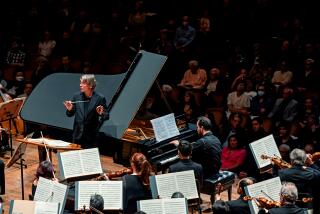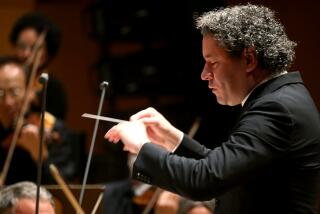Beethoven and Boulez: Clash of Revolutionaries
Monday evening at the Monday Evening Concerts was unusual. Most of the time was spent listening to Beethoven, not the new music for which this series is well known. Only at the end did the music become more modern, but even that, a bit of Pierre Boulez, was written more than half a century ago. And yet the audience, the typical small but loyal crowd of sonic adventurers in the Leo S. Bing Theater of the Los Angeles County Museum of Art, got their adventure anyway.
The Beethoven pieces were two of the late string quartets, which were not only revolutionary in their day, 175 years ago, but came to be held in awe in the 20th century for their prescient modernity. The bold harmonies, shocking rhythms and amazing contrapuntal complexities present a radical concept of sound that may never cease to shock.
The context the Parisii Quartet chose was appropriately French. Following Beethoven Quartets in E flat major, Opus 127, and F major, Opus 135, the ensemble played the first two of the six âchaptersâ of Boulezâs âLivre pour Quatourâ (Book for Quartet), as the first in a two-concert âBeethoven/Boulez Projectâ at the museum.
Yet attractively alliterative as the names of these two musical revolutionaries may be, Beethoven and Boulez do not necessarily make a happy programming pair. In an essay written in 1970 for the Beethoven bicentennial, Boulez, in a bad mood from mindless mass Beethoven worship, called him a âmagic lantern for a host of monkeysâ and railed against considering once-rule-breaking music still relevant. âA Greek temple does not teach you how to build a skyscraper of steel and glass,â Boulez warned.
But Boulez did allow that there is delight in the mysteries of the past, that dead stars still glitter. And in this sense the Parisii offered some interesting insights as it sought to recapture some of those past mysteries. The quartet is quintessentially French in that its tone is somewhat nasal and it cherishes lucidity. Rhythmically, this is an exciting ensemble. The playing is physically propulsive--in the Vivace movement of the F major Quartet, the first violinist, Thierry Brodard, played with his left leg far forward and his right braced behind him, as if to withstand a powerful accelerating force. On the other hand, the glowing slow movement of that quartet, and the massive and visionary slow movement of the E flat Quartet, were clean, serene and probingly analytical.
*
The Parisii is striking in the lower instruments, with an elegant cellist, Jean-Philippe Martignoni, and a rich, strong violist, Dominique Lobet; and all four players (Jean-Michel Berrette is the other violinist) are just lean enough in their playing to ensure ever transparent textures and penetrating enough to give the quartet a robust and immediately identifiable sound. But the transparency has one drawback. When intonation is not exact, and it wasnât always exact in the violins, it startles more than it might if this were a plush-toned ensemble.
The three brief parts of Boulezâs âLivreâ--1a, 1b and 2--came at the end of the concert. The score is curious. Written in 1948-49 (except for the sixth part, which was written 10 years later), and then withdrawn until recently (except in a string orchestra version), the quartet is little known and has the reputation for being among Boulezâs most intellectual and least communicative works. Its highly condensed and organized structures are made of tiny, flickering gestures in the individual instruments. But the Parisii, dazzling in its attention to detail and its liveliness, made all those fragmented sounds seem as fascinating as observing an unpredictable natural event, a meteor storm or a swarm of darting insects.
In the end, Boulezâs music doesnât have much to say about that of Beethoven, who tried to control rather than represent nature. But revolutionaries rarely get along with each other, and, at least, the Parisii--which remains in town next week for a more traditional series of concerts sponsored by the Music Guild, does a fine job in keeping their different revolutions alive.
* âBeethoven/Boulez Projectâ concludes tonight at 8 p.m., $5-$15, Leo S. Bing Theater, Los Angeles County Museum of Art, 5905 Wilshire Blvd. (323) 932-5839. For information on the Music Guild concerts, call (310) 552-3030.
More to Read
The biggest entertainment stories
Get our big stories about Hollywood, film, television, music, arts, culture and more right in your inbox as soon as they publish.
You may occasionally receive promotional content from the Los Angeles Times.











